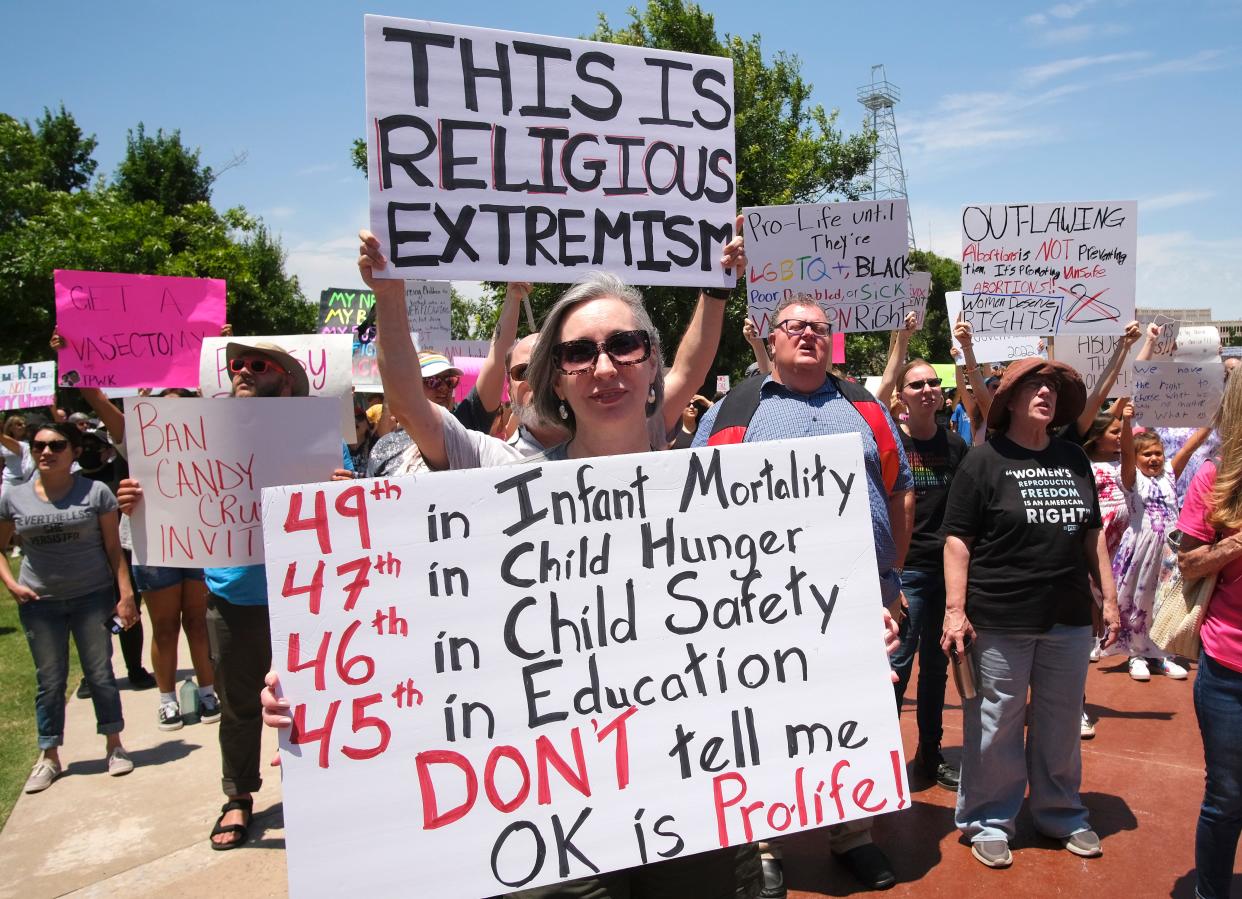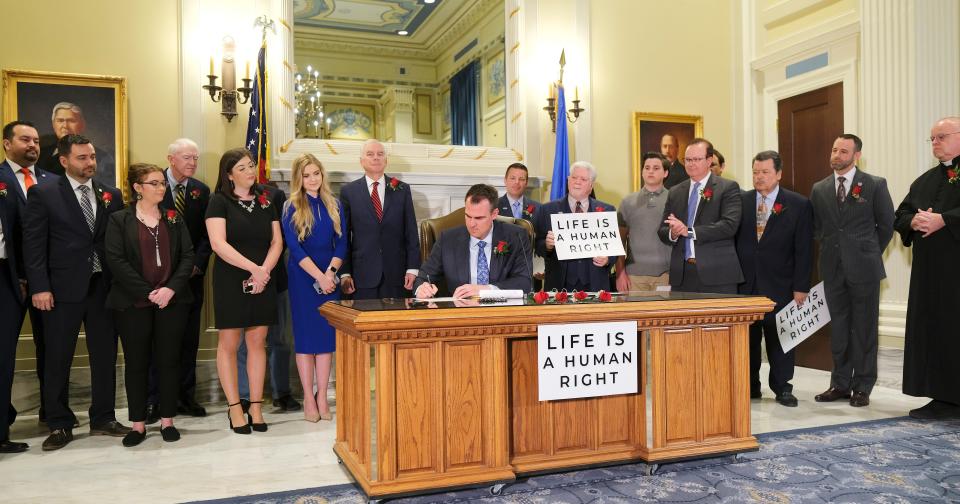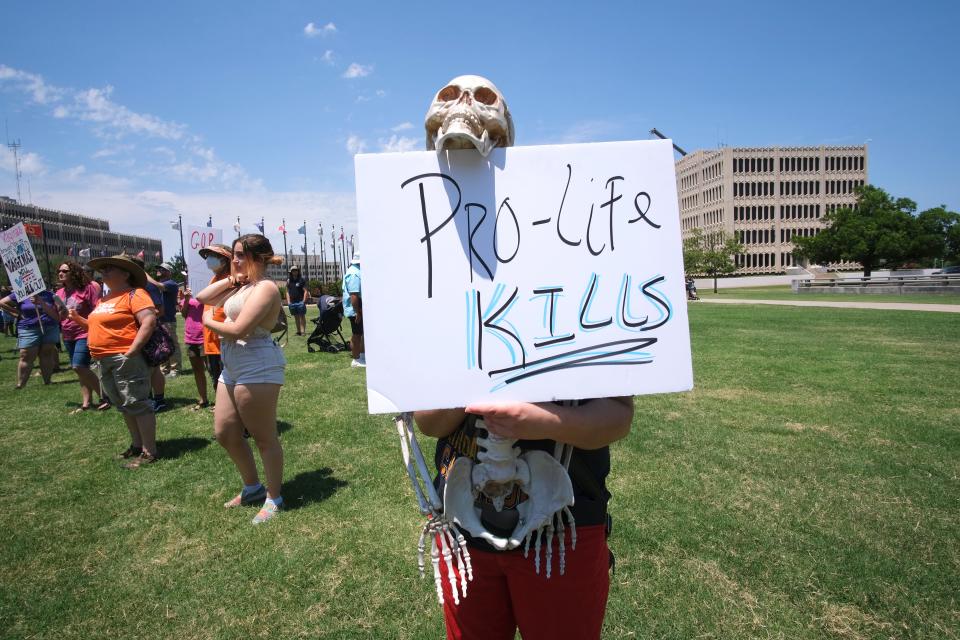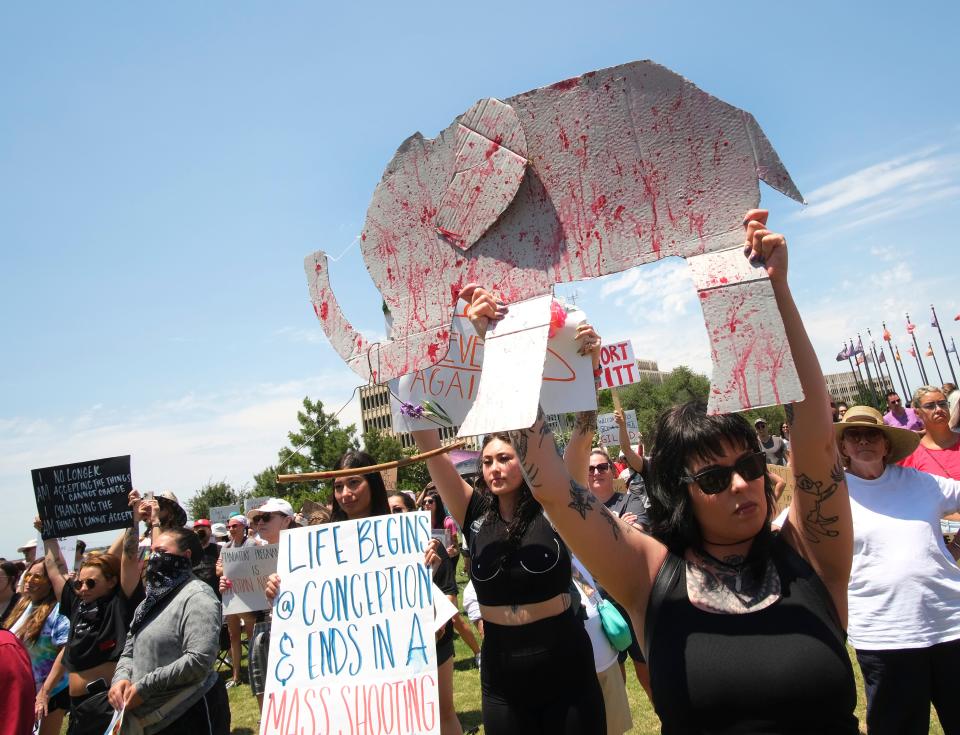Roe rage? Oklahoma women share their thoughts on anti-abortion laws

Last week, we asked women living in Oklahoma to weigh in on the decision by the Supreme Court to overturn Roe v. Wade — leaving the right to an abortion in the hands of state legislatures. Oklahoma currently holds the most restrictive abortion law in the nation — prohibiting abortions from the moment of fertilization.
Polls show 29% of women in Oklahoma support a total ban on abortions, but responses were overwhelmingly against the Roe v. Wade decision. Here are some of their views on the issue:

Anti-abortion law is too vague for doctors to perform lifesaving care
"I’m a nursing student. I’ll be done at the end of July. I have a job in an ICU. I cannot fathom how quickly this ruling impacted real people. So many stories of doctors waiting to give lifesaving care because the wording “to save the life of a mother” is so vague and medical licenses people spent years working for are on the line. So much propaganda using verbiage that includes “baby”. What we are talking about are embryos and fetuses. The definition of 'baby' does not apply until a cord is cut. As someone who does not identify as Christian, it is unconstitutional for you to use your religion to dictate the lives and choices of others. These words don’t even scratch the surface of how I feel. I haven’t even felt all my anger yet. I haven’t even been able to sort out how to explain this to others."
— W.E., Tulsa
Murdering an innocent life is not an option
"When Roe v. Wade was passed, ... they knew it would never last and I'm sure are surprised it lasted as long as it did. Why? Because it was not written into the Constitution. You can only twist words for so long before they straighten themselves back out again.
Less than 1% of abortions are due to incest and rape. Miscarriages and ectopic pregnancies are not abortions, no matter how you swing it. They talk about guns killing people, but over 600,000 babies are aborted in the US alone every single year.

Coming from a mother of three, having my oldest two at 18, 19, and my third at 21, I saw it as dealing with the repercussions of my actions. Murdering an innocent life was never an option. I think giving the choice back to the states and keeping the higher government out of it was the best thing to happen. Maybe people will grow some respect for themselves. All I know is Jesus loves you and all the unborn children in their mother's womb."
— Chanel McHenry, Ponca City
Supreme Court made pregnant people seem less than
"What did I think when the Supreme Court banned abortion? I was mad. I thought we were done, finished, kaput. Then I thought about it. Now I think Supreme Court actually gave us the incentive to really think about their decision because this is not about abortion.
If it were about abortion, Alito would not have cited a man from the 1600s, a man who believed in witches, and who thought it was ok for a man to rape his wife. Alito would not have cited a priest from the 1100s. Granted Henry de Bracton is credited with laying out English common law (which a lot of our laws are based upon), but this is the man who said women are inferior to men. Alito also would not have cited William Blackstone, who died in 1780. He said when a woman marries, she ceases to exist.
So to me, with this decision, the Supreme Court has made our control of our lives a privilege. But is it? Or is it the right of human beings to have control of their bodies, control of their lives? The Supreme Court has made all people who aren’t them, less than. Less than human. Less than capable. And with this decision, the Supreme Court says being human is a privilege, not a right.
To me, this decision and most of the decisions made by this court this session, are more sinister than just banning abortion. This court has made all people of this country, except those who believe like them, irrelevant. With these decisions, this court is continuing the unceasing 50-year march to stop us from voting, to make sure that everyone who disagrees with us has a gun, to make us afraid of each other, to not hear us.

We still have the right to vote, this time, for people who do not think that people unlike themselves are less than human. This is the time to really think about what the Supreme Court is doing to our country. Do we not want to be able to make decisions about our welfare, our lives, our bodies? This is where we are right now."
— Carolyn Dershem, Oklahoma City
Roe v. Wade was central to women's liberty
"As we consider what we can do as Roe v Wade is reversed the following thoughts might offer some perspective.
During the years of planning the structure of a new government that would take effect if the colonies declared their independence from England, John Adams, a principal planner from Massachusetts, while in Philadelphia, received a letter in the spring of 1776 from his wife Abigail in which she exhorted him 'don’t forget the ladies.' Actually, she said, 'if particular care and attention is not paid to the ladies, we are determined to foment a rebellion, and will not hold ourselves bound by any laws in which we have no voice or representation.' Of course, neither 'the ladies' nor 'the slaves' were mentioned in the Constitution. There was no rebellion until the Civil War, and slavery was explicitly outlawed in the 13th Amendment to the Constitution in 1865. The rights of women have not yet been completely guaranteed. Women waited until 1920 and the 19th Amendment to have a vote and have made great progress since in representation in the law. But today we face the overturn of Roe v. Wade, the case that goes to the heart of a woman’s liberty, the right to control her own body.
Several states including Oklahoma have outlawed abortion completely. Why am I worried? Many rights depend on a recognition of the right to privacy and they are in jeopardy, including the right to contraception of any kind.
The decision may be safe for Alito and Thomas’ court but we are not yet in their America. And that’s why, in the spirit of Abigail Adams, I am determined to 'foment a rebellion' against the denunciation of my daughters and granddaughters' personhood through the power of protest assembly, speech, judicial redress, and the ballot.
We have a responsibility and an opportunity in front of us."
— Deborah Shinn, Oklahoma City
I chose to have kids. My daughters should have that choice, too.
"My name is Penny Burks. I’m a constituent in Perkins Oklahoma. I have three children that I’ve given birth to, two of which are female and are under the voting age.
While many in my town celebrate Roe v. Wade being overturned, I have a different tale.
I have suffered through two early miscarriages. Luckily for me, unlike many women in this country, I did not need the assistance of a doctor to survive those miscarriages. My body expelled all of the contents of my uterus on its own. Had it not done so, I would have needed a dilation and curettage procedure.
For those that do not know what that is, it’s an abortion. It’s the removal of the contents of a female uterus followed by bleeding for a period of time just as if your body had given birth.
While I was having both miscarriages, I distinctly remember hemorrhaging for several hours, followed by contractions and the need to push. I went into actual labor at seven and eight weeks pregnant.
Before I became pregnant for the very first time, I did not want children. I wanted to be a doctor. I was married, I was young, and I was in a stable environment. It is the only reason I CHOSE to carry my children to term.
The last time I became pregnant, I was so worn out by pregnancy itself, that I heavily considered abortion and tubal ligation. After all, this had been my fifth pregnancy. Instead, I CHOSE to carry her as long as God would allow and gave birth to a very bright spunky tomboy of a girl.
The key here is I CHOSE to give birth.
Not everyone wants children. Not everyone can have healthy perfect children and not everyone wants to go through pregnancy after pregnancy after pregnancy.
I’m heartbroken that I’ve given birth to two girls who will not be given a choice in their reproductive history. ...
I recognize that now, in this over-reaching government world we live in, both my girls are at risk. ...
I want to know how this state will protect my daughters from pregnancy before adult age. In Ohio, a 10-year-old was raped and can be prosecuted for terminating her pregnancy. I refuse to hand my child over to law enforcement. I will flee this country before I allow them to go to jail for their bodies."
— Penny Burks, Perkins
Forcing pregnancy on women is barbaric
"If you think the recent abortion decision does not impact you ... wait. This is a blow to the rights of every single person living in America. We value body autonomy so much in this country that the government can’t remove a corpse’s organs without permission, even though their kidney may keep a renal failure patient from dying. The government can’t force you to donate blood to save a trauma victim, even though that is essentially a risk-free process. So why should the government be able to force me to use my uterus to save a potential life?
Simply put, pregnancy is dangerous. It’s been deemed unacceptable in polite society to discuss things like pelvic floor damage, incontinence, postpartum depression, mastitis, or fistulas, but these are all real possible complications from growing a human. It is ableist to assume everyone who births a child will survive, let alone survive without permanent physical or mental problems. To decide to take this risk for yourself is one thing, but it’s another for the government to tell you that you have to.
Implementing forced birth in a country with no universal healthcare, a high maternal mortality rate, and no paid paternal leave is both archaic and barbaric. If you truly care about saving children, you should be horrified by a ruling that will force them to risk their lives in order to carry their assailant’s embryo to term. Saying people can just go to a state where it’s legal is a privileged thought process that assumes every person has the finances to take time off work, transportation to travel state lines, and money for high gas or plane costs, let alone the price of the termination itself. This ruling effectively blocks many of the people who need abortion services the most, those in poverty, from accessing the healthcare they deserve.
We are country founded on the separation of church and state and the Supreme Court is on a warpath to blur that separation. They have told us in no uncertain terms what they are coming for next: contraception and same-sex marriages. We cannot sit by quietly and let these extreme view remove our most sacred freedoms. We must be loud and vote consistently. We need to work to abolish abstinence-only sex education, which has proved time and time again to lead to unwanted pregnancy. We should ensure that anyone who wants birth control should have access to it, no questions asked. We have to insist on paid parental leave. And we have to advocate for people without the resources to do so for themselves Shame on the Supreme Court and those who think healthcare decisions should be made by anyone except a patient and their doctor. Reproductive rights are human rights. Fight for them."
― Kathleen Thomas, Sapulpa
All viewpoints are welcome and encouraged. Tell us in 250 to 400 words, and email it to yourviews@oklahoman.com. Please include your name and the city where you live. Additional responses to the Roe v. Wade ruling will be published in the online version of this article at Oklahoman.com.
This article originally appeared on Oklahoman: Oklahoma women share their thoughts on anti-abortion laws

